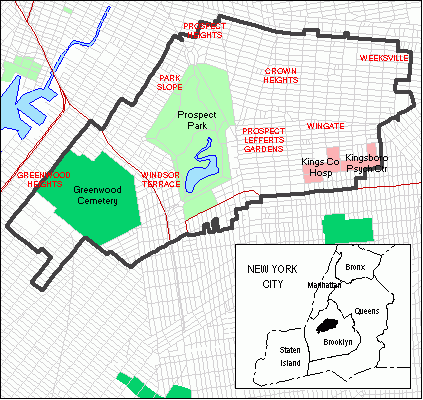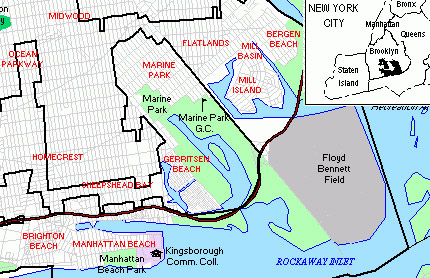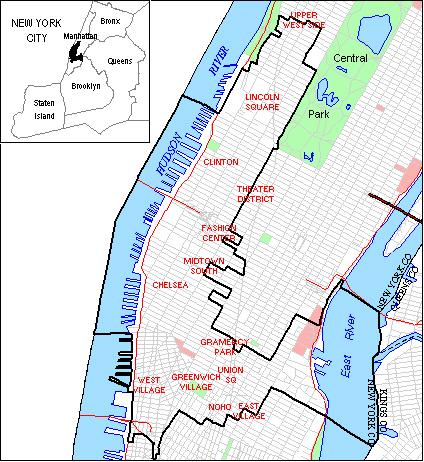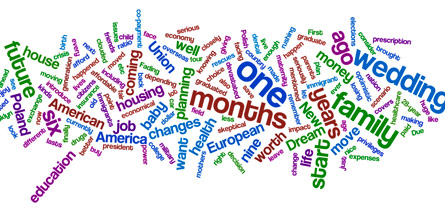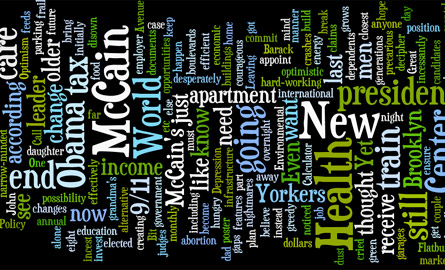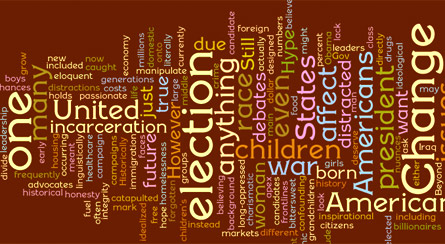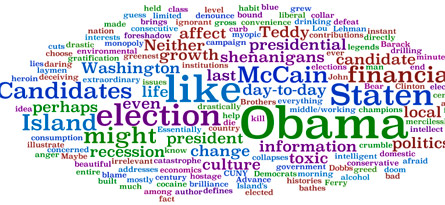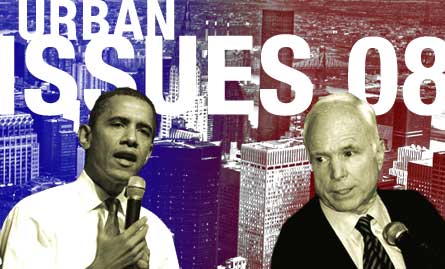
Gotham Gazette image by Ya-Hsuan Huang
The day before the final debate between presidential candidates Barack Obama and John McCain, a group of mayors reiterated a longstanding plea. Cities matter, they said, and it was time for the candidates to show they understood that and tell the country what they would do about it.
Their entreaty went unanswered. Obama and McCain managed to touch on lots of things in their third encounter -- from Joe the Plumber to health to whether a community organization threatened the fabric of democracy -- but they did not discuss urban issues.
Small towns get a lot more notice -- at least from Republicans.
"We grow good people in our small towns, with honesty, sincerity and dignity," Sarah Palin said in her acceptance speech, quoting ultra right-wing writer Westbrook Pegler. The GOP vice presidential nominee went on, "They are the ones who do some of the hardest work in America ... who grow our food, run our factories and fight our wars."
This, some commentators quickly observed, does not paint a true picture of American in the 21st century. "We're in total denial about the fact that we're an urban country," said Diana Lind, editor of the Next American City.
Perhaps, but the rural image of America persists in campaign rhetoric and policy discussions. And this year, neither Barack Obama of Chicago nor John McCain of Phoenix chose to break the pattern.
Urban Nation
"We haven't been a nation of small towns for nearly a century," Time magazine's Joe Klein groused after Palin's speech. "It is the suburbanites and city dwellers who do the fighting and hourly wage work now, and the corporations who grow our food."
The comments by Palin, Giuliani and others at the Republican National Convention, the Time's Gail Collins complained, implied that people who live in cities do not have good values, work hard -- or even honor their war dead.
About 80 percent of Americans live in or around cities -- though most do not live in densely packed center city neighborhoods. Some 86 percent of U.S. jobs are located in the metropolitan areas, which generate an estimated 90 percent of the country's gross domestic product.
Of course, as with almost all numbers, others offer a different interpretation. In terms of people, Carl Bialik has written, most people live neither in big cities nor small towns, according to the U.S. Census. By Bialik's count, though, about 82.4 million Americans live in large cities.
Given the propensity of politicians to pander to the smallest interest groups, why do they lambaste cities with such impunity? Or to put it another way, why does former Mayor Rudolph Giuliani -- a man who enjoys opera and pricey cigar bars -- sneeringly thrash Obama for being "too cosmopolitan?"
Lessons from the Past
Some see it as a remnant of our history. "The myth of rural virtue and urban vice is an old one in this country, and it persists no matter what changes the landscape," wrote Steve Chapman, a columnist for the Chicago Tribune. ("Most Americans," Chapman snidely added, "can tolerate hearing of the superiority of small towns, as long as they don't have to live in one.")
Thomas Jefferson, for one, saw little to like in cities viewing them "as pestilence to the morals, the health and the liberties of man."
The attitude continued, as immigrants first from Germany and Ireland and then from eastern and southern Europe crowded into urban neighborhoods bringing different religions, cultures and habits with them.
Following World War II, many Americans left the cities -- though they tended to go to the suburbs and not isolated small towns. By the 1970s, many cities had seen their economies wither, their neighborhoods decay, their tax rolls shrink and their populations decline. To people in the surrounding suburbs, the country's center cities seemed dirty, dangerous and blighted.
Their very survival seemed in doubt. In 1980, a commission appointed by President Jimmy Carter and chaired by former Columbia University president William McGill concluded cities are "no longer the most desirable settings for living, working or producing," and said aiding them would inhibit national "policies that seek to increase productivity, to expand markets, to create jobs and to nurture new industries."
"Stated differently and harshly," a commentator observed, "let the people move to where the jobs are and let the national government stop worrying so much about people and places left behind."
Many cities, though, not only stayed alive but thrived. A number -- most notably New York -- have seen their populations grow, crime rates fall and, at least until the current turmoil, their economies boom. Some people even began leaving suburbs to return to the cities.
Politicians seemed slow to notice. While Democrats continued to win votes in the cities, the party's most successful politicians -- Carter, Bill Clinton, Al Gore -- stressed their rural connections. Republicans, particularly during the George W. Bush administration, persisted in their anti-urban bias. Bush cut programs aimed at cities, catering to the views of his fundamentalist supporters, many of whom saw cities "as sites of decay, ghettoization, promiscuity, moral pollution and unerring welfare dependency," wrote Stephen Graham, a British professor of urban geography.
Underscoring Bush's policies, said Lind, was his appeal "as somebody from Texas" who had a ranch.
Politics of the Present
Obama, though, does not, as far as we know, chop down brush. He has lived in or near the country's three largest cities -- New York, Los Angeles and Chicago -- and has spent most of his professional life in Chicago as a community organizer, a professor at an urban university and a state senator representing a city district.
Obama, of course, is also the first black major party presidential candidate. With race as the great unknown in this campaign, no one can determine how much "small town" is a code word for white. "People don't like to admit one source of anti-urbanism is race," said Josh Leon, a political scientist who blogs for Next American City.
The Republican embrace of small towns is "a disingenuous marketing campaign ... aimed primarily at white people, and designed to set people against one another, to accentuate our differences and play on our fears," wrote Rosemary Weathers Burnham, a columnist in Lexington, Ky., who grew up in a small town.
Obama, of course, got in trouble during the primary campaign when, at a San Francisco fundraiser earlier this year, he described people in economically depressed small towns as bitter. "They cling to guns or religion or antipathy to people who aren't like them or anti-immigrant sentiment or anti-trade sentiment as a way to explain their frustrations," he said.
Practical Politics
It is, in many respects, not surprising that Republicans do not like people who live in big cities: People who live in most big cities do not like Republicans.
For this election year, Patchwork Nation, a project of the Christian Science Monitor, has divided the country by variety of community, identifying 11 key types. "Industrial metropolises," including New York are the most overwhelmingly Democratic of the 11 categories. "Bush won roughly 32 percent of the popular vote in these communities in 2004, and that was the best the GOP had done there in three presidential elections," according to Patchwork Nation.
Democratic presidential candidate John Kerry won 52 percent of the vote in urban areas in 2004, but less than 40 percent in rural and exurban counties, according to Slate. In 2004, Kerry counties had 836 people per square mile. Bush counties averaged 108 people per square mile in 2000 and 110 four years later.
Democrats, though, do not talk much about big cities either.
Chris Bowers of the Open Left blog thinks the realities of the current campaign go a long way toward explaining that. During the primary campaign much attention has traditionally focused on rural states -- New Hampshire and Iowa. In the general election most of the largest cities -- New York, Los Angles, Chicago, Houston -- are located in solidly red or blue states.
"Philadelphia and Detroit are the two largest cities in 'swing states,' and the only top 10 metro areas that are mostly or entirely in swing states," Bowers said in an e-mail. As a result, between the primaries and general elections, "presidents are not really forced to spend much time talking about urban policy."
In trying to win the swing states, said Leon, Democrats go after moderate voters and try to avoid the fault lines of religion and race.
Beyond that, the candidates have a lot of thing to speak about, making it perhaps not surprising that cities get squeezed off the stage. "We're in an enormous financial crisis, and before that, the campaign was a debate about the war in Iraq," said Lind.
Making Policy
Whatever the reason for the rhetoric, it has practical effects. "The perpetuation of this small-town myth is a large part of why candidates can't talk about cities," said Harry Moroz of Mayor TV, a project set up by the Drum Major Institute and The Nation to encourage candidates to discuss cities.
Mayors, said Moroz, believe "they really have no influence over federal policy and because they have no influence, there is no recognition of the critical role of cities."
Even if he chooses not to discuss urban issues before general audiences, Obama does have a section of his Web site devoted to urban policy. (For details of the candidate's urban policies, see related story.)
Poverty and its effects still pose a problem in many cities, Obama said in a speech in June to the National Conference of Mayors. He went on to signal a new direction in urban policy.
"We also need to stop seeing our cities as the problem and start seeing them as the solution," the Illinois senator said. "Strong cities are the building blocks of strong regions, and strong regions are essential for a strong America. That is the new metropolitan reality and we need a new strategy that reflects it."
Lind, for one, views that perspective as vital. "It's important that we're not just talking about poverty and crime but talking about cities for economic reasons," she said.
Outside of a few specific settings, though, Obama does not stress his urban agenda. Leon said he attended an Obama rally in North Philadelphia and was "struck by how little that talk corresponded with North Philadelphia... He didn't discuss the blight and poverty issues."
Many see Obama's decision to tread lightly on these concerns as not simply an oversight, but part of his need to avoid alienating white voters who may not live in big cities. He won't be a spokesman for an urban agenda, Corey Dade wrote in the Wall Street Journal, "in an effort to insulate him from potential backlash."
McCain has sounded no urban theme and his Website is largely silent on the issue of cities. An analyst for the conservative Heritage Foundation has said, though, that many of McCain's proposals would help Americans who live in cities. For example, she indicated school vouchers could benefit families in cities dissatisfied with the quality of local public schools.
Some experts think the lack of explicit urban programs in McCain's platform does not reflect a lack of concern but rather his belief that the private sector, not government, should solve urban problems, according to Scott Cannon of McClatchy Newspapers.
If polls and past elections can be believed, Obama will swamp McCain in most urban areas, though many suburbs will be hotly contested. As to whether an Obama victory would bode well for cities is harder to predict. With the economy tumbling, a President Obama will face many competing demands.
"I think the best that can be said is that Obama would have cities more in focus, but given Obama's economic stance and the financial meltdown, I am not convinced that an Obama victory will bring any great windfall to the cities," Neil Smith, a harsh critic of Bush urban policies and director of the Center for Place, Culture, and Politics at CUNY, said in an e-mail. Smith went on to express concern about Obama's "emphasis on individual and family spirit and lack of a class analysis." But, he continued, "Of course, the situation with a McCain (administration) would be predictably worse: a man who doesn't even know how many houses he has, (has) little allegiance to cities."
From the other side of the spectrum, E.J. McMahon, director of the Empire Center for New York State Policy offered another view. "An Obama administration will focus on policies that benefit New York City," he said, but that might not be good. "Federal urban policies tend to distract from what cities need," McMahon said, adding cities did better "when the federal government had a policy of benign neglect."
Â
